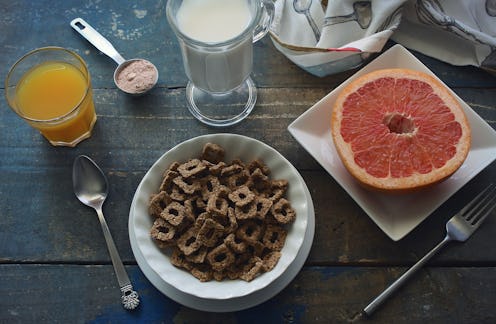Life
7 Signs You Need More Fiber In Your Diet

We all know the importance of having a balanced diet, but sometimes it can be hard to tell what nutrients we are lacking without going to see a doctor. But if your diet is short on fruits, vegetables, and whole grains, you may be exhibiting some signs that you need more fiber in your diet. It may not be the first thing you think of when making your meals, but ensuring that your diet has enough fiber is important for multiple aspects of your health.
"Health professionals recommend adults consume between 25 and 35 grams of fiber a day, but most people get less than half that amount— between 14 and 15 grams a day," says Patricia Bannan, MS, RDN over email. "Because they help fill your stomach and increase digestion time, fibrous foods make you feel fuller longer. Another bonus: fiber-rich foods like fruits, vegetables, beans, and whole-grains are loaded with vitamins and minerals, making them a healthy bet overall."
Fiber is found in most plant-based foods, so eating a diet high in fresh, whole foods can help ensure you're eating a proper amount, but if you're not positive that you're getting enough of the nutrient, consider these seven signs from your body that are telling you that you're not eating enough fiber.
1. You're Constantly Hungry
"Fiber helps keep us fuller longer, so if you aren't getting enough, you may be finding yourself hungry between meals," says Bannan. Fiber takes longer to chew, which gives your stomach enough time to tell your brain that you are full, according to SFGate. It also slows digestion, giving your intestinal walls more time to absorb vitamins and nutrients.
2. You're Irregular
If your bathroom schedule is a little erratic, it might be time to up that fiber intake. "Fiber is an important nutrient for our GI tract," says Bannan. "Insoluble fiber acts more like a broom, essentially 'sweeping' out your intestines and helping keep you regular."
3. You're Constipated
Constipation is one of the most common symptoms of lack of fiber. According to Everyday Health, "Soluble fiber allows more water to remain in your stool, making waste softer, larger, and thus, easier to pass through your intestines. Insoluble fiber adds bulk to your fecal material, which hastens its passage through your gut and prevents that constipated feeling." Incorporate both types of fiber into your diet for smoother digestion.
4. You Feel The Afternoon Slump
Eating foods rich in fiber can help keep your blood sugar levels steady, which can prevent a crash later in the day. "When you eat foods that contain the trio of protein, fiber and good for you fats, it takes your body longer to digest, keeping blood sugar and energy levels more stable," says Bannan.
5. You Have High Cholesterol
"Research shows a strong connection between fiber intake and lower cholesterol levels," says Deborah Orlick Levy, M.S., R.D., Carrington Farms Health and Nutrition Consultant, over email. "Cholesterol binds to fiber as it moves through the tract and is eliminated if there is enough fiber in the body. If fiber is not there, the cholesterol ultimately builds up in the body."
6. You're Low On Energy
A low-fiber diet can leave you nauseous, tired, and weak, according to WebMD. High blood sugar and cholesterol can lead to fatigue, so it's important to include enough fiber to fight off feelings of tiredness. One study from the International Journal of Food Sciences and Nutrition found that people who ate a breakfast high in complex carbohydrates had more energy throughout the day than those who ate a breakfast just high in fat.
7. It Hurts To Digest
"A low fiber diet leads to constipation and straining, which may over time lead to diverticulosis," says Levy. Diverticular disease, which involves painful inflammation of diverticula — small bulges that form along the digestive tract, is usually a result of a low-fiber diet, and it can make digestion painful, according to Everyday Health.
If you are exhibiting these symptoms, talk to a doctor or nutritionist to see how you can start incorporating more fiber into your diet.
Images: Pixabay (8)